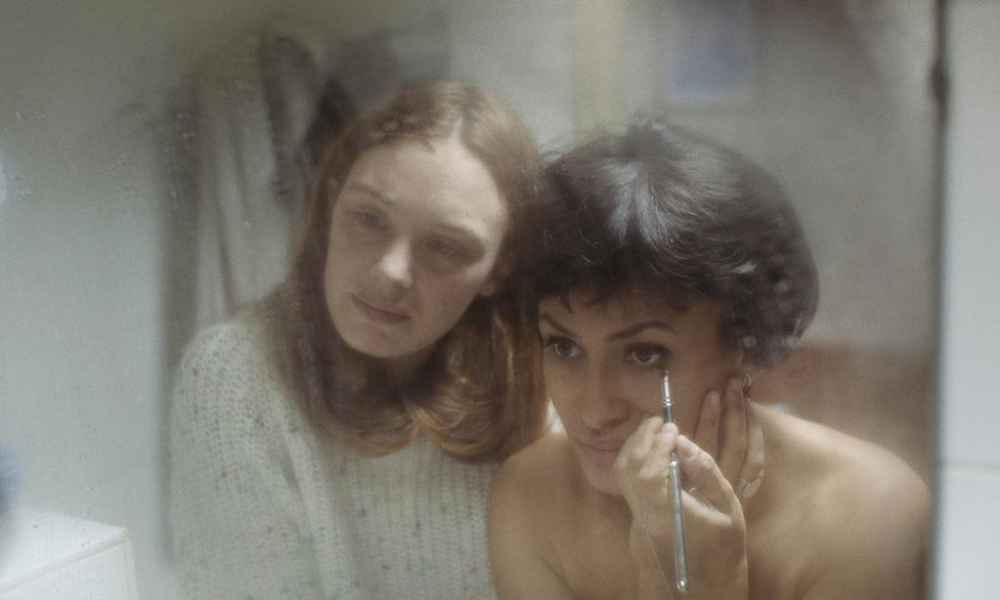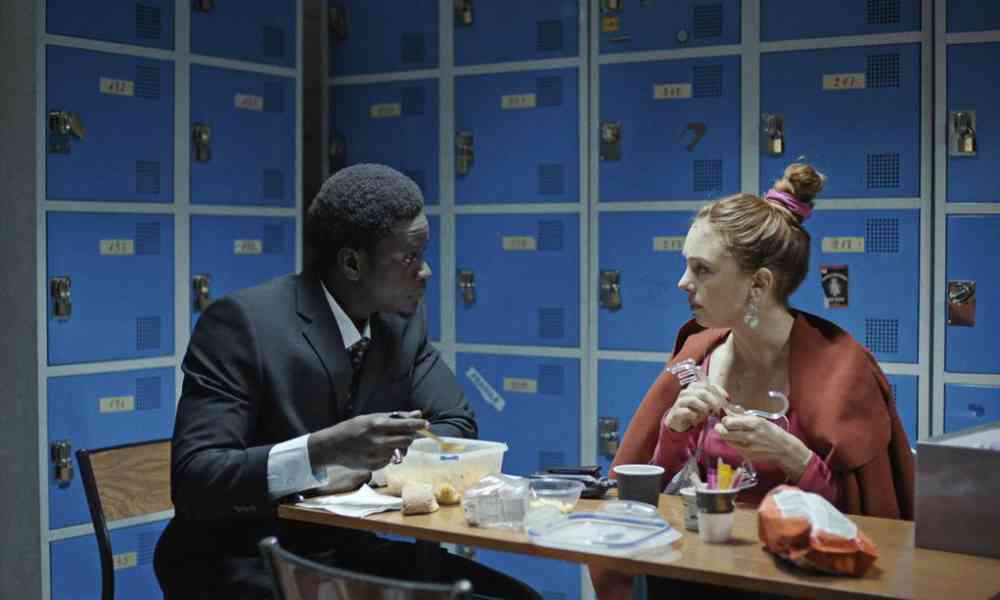Léonor Serraille discusses her feature debut Jeune Femme, a portrait of a complicated, impulsive young woman and her process of self-reinvention.

Léonor Serraille’s feature debut, Jeune Femme, won over critics at last year’s Cannes Film Festival. In its unflinching depiction of a young woman in crisis, dealing with a difficult break-up in her own unique way, the film felt quietly revolutionary.
Paula (played by the phenomenal force of nature Laetitia Dosch) is messy and quirky, but never a manic pixie dream girl. An almost compulsive liar, she can sometimes be quite the opposite of charming. Yet her impulsiveness and her rare generosity towards others equip her with an incredible ability for cracking the shell of everyone she meets. An unwieldy and complicated person herself, she lets others exist in their full complexity — even if they would rather not have their true selves exposed in that way. Yet Paula is never haughty or judgmental towards those well-behaved people, whose lives, unlike hers, are in perfect order. Rather, these encounters are fundamental components of her new, independent, disenfranchised identity: little by little, she is reconstructing herself, devouring the world around her without fear.
Back in Paris in January, the director talked to me about the pleasures and dangers of writing a protagonist that is quite different from herself; depicting the harsh economic reality of Paris life; creating an ‘open portrait’; and the film’s connections to Inside Llewyn Davis and Frances Ha.
Seventh Row (7R): What was the genesis of Jeune Femme?
Léonor Serraille: It was my diploma screenplay at the Femis. I knew that it would be a year of writing, so I wanted to focus on the genre of the portrait film. I wanted to go through experiences I’d had in Paris, mostly work experiences: I’d looked after children, worked in stores, lots of different things. I thought there was something to be done with all that, though I didn’t really know what exactly.
Then, very quickly, I got the idea for a story of enfranchisement: a woman who, through bad times, manages to get better anyway. The story was very easy to figure out, but the character of Paula took a while. It took time to meet her and to find her in her dialogue.
7R: Regarding Paula, Laetitia told me that the role was very much written, but when I met her, she seemed so similar to Paula. How did this character in Jeune Femme come about?
Léonor Serraille: In reality, Paula isn’t Laetitia at all, but they have a lot in common. Both of them are very spontaneous and true, but also brutal — they don’t cheat. Yet, at the same time, Paula is much weirder. Laetitia wasn’t playing herself; she really had to build something.
What was striking about Laetitia was how fast she was talking. We had a coffee together when we first met, and I was rather impressed by the flow of her conversation. Laetitia is always in the present moment, and so is Paula. That was very important. Paula makes a lot of jokes, and Laetitia is similarly attracted towards comedy. What required a bit more work was the more depressed side of the character.

7R: You said that Paula is weirder than Laetitia. We are often very surprised by everything Paula does, yet by the end of the film, we do understand her. How did you find that balance between a quirky, unpredictable character, and someone that feels real?
Léonor Serraille: She functions in a very naive mode, close to childhood, so her reactions and the way she deals with things aren’t that strange in this context. For children and animals, adapting themselves constantly to their surroundings is a survival instinct. They know how to find their place.
Because she has almost nothing left after her boyfriend leaves her, Paula is able to blend in with the decor and adapt to situations. And suddenly, what was an annoying fault becomes an advantage. She starts imitating people: at the beginning of the film, she’s letting herself go completely, but then she starts doing her hair, dressing better, etc. She constructs herself with little touches. She picks the things she likes and integrates them into the character she is building for herself.
It was very difficult to find the right tone for the dialogue and the ruptures she has. We had to find this energy that would make us feel like she might start crying or laughing at any moment. That was very interesting to find with the text, but also with Laetitia, because we had to be worried about Paula, while, at the same time, telling ourselves, “Oh no, she’s fine.” It’s like in real life, where there are people who look like they’re going to crumble, but they’re strong.
We always put people in one category, but Paula has many things going for her. I think we love people who are complicated and complex. Ultimately, Paula isn’t that different from the people I see in my life.
[click_to_tweet tweet=”‘She might start crying or laughing at any moment.'” quote=”‘She might start crying or laughing at any moment.'”]
7R: The way you talk about Paula, it sounds like she isn’t like you very much. What is it like to write a character from scratch that is very different from you? Does it help to have a distance from it?
Léonor Serraille: It helped me, in the sense that it freed me. The more different the character is from me, the more I will feel free to insert everything I want into that character. Paula is very talkative — she speaks to people, and it’s like opening a tiny door. Everything can go through that door; everything is possible with Paula. It made me feel really good.
But you also need to know where to stop. We want to make her talk for hours, but it needs to be calibrated because she can become annoying. I had to find a balance where I could be sincere without using that character as a cathartic vehicle for solving my own frustrations.
7R: Jeune Femme is centered on Paula, but the secondary characters are three-dimensional and we learn about their lives beyond their jobs Ousmane, the black man working as a security guard in the mall, could so easily have become a horrible, one-dimensional cliché. But we get to see so many aspects of his life: his house, his children, and the way he lives. How did you manage that?
Léonor Serraille: I wanted the film to be an open portrait of Paula; I wanted the other characters to build her. They were as important as her. I wanted those moments to be like films within the film and those characters to be very present, even though they only have a few scenes. They couldn’t be stereotypes.
The casting was also very important. For example, the security guard, Ousmane, I initially thought would be more French than African. Then I told myself, “No”, I’ve met many African security guards; it’s important to show them, so let’s go! It required being astute, without being sentimental. Creating those characters was very difficult, but I liked seeing just how much it changed her to meet them. It was an exchange between them.
Many of those characters were cut in the editing, but I couldn’t have written just about her. She’s also a tiring protagonist, so there was this need to decompress, with the character of the little girl or her mother, for example. These were femininities different from hers. Some of those women were very beautiful; others were mysterious. I thought it would be good for Paula to be confronted with other women, so she could figure out what she wanted.

7R: For the character of Paula, I imagine it was a collaborative process with Laetitia. Did many things change between the script and the final film?
Léonor Serraille: I actually looked at that the other day because we were editing the script, and the dialogue hasn’t changed that much. What has changed are some of the actions in the film. I knew the script by heart, and I was a little irritated by it, so I was very happy for the actors to tell me their ideas — but not about the dialogue.
For example, it’s written in the script that Paula cuts herself some bangs at the beginning of the film, but for reasons of continuity, it was too complicated to have bangs. So Laetitia told me, “Wait, I’ve got a great idea; what do you think of an Amy Winehouse hairstyle?” It was great, and it helped us a lot. So there were lots of suggestions about actions, but we didn’t change the dialogue much.
[click_to_tweet tweet=”‘Some of those women were very beautiful; others were mysterious. I thought it would be good for Paula to be confronted with other women, so she could figure out what she wanted.'” quote=”‘Some of those women were very beautiful; others were mysterious. I thought it would be good for Paula to be confronted with other women, so she could figure out what she wanted.'”]
7R: Jeune Femme starts with Paula breaking up with her boyfriend. It is an extremely emotional story, but you don’t tell it in a sentimental way. Instead, you show how Paula doesn’t have a house, doesn’t have a job, doesn’t have money anymore: it’s very concrete and material.
Léonor Serraille: As someone who lived in Paris for 10 years when I was studying, I thought the material side of things — money, survival, paying for the bus fare — was very important. I had very little and needed to be careful.
In Paula’s case, what interested me was that she isn’t completely homeless. If she wants to, she can move to her mother’s house, like many young people do. But she doesn’t want to do that. And I wanted her not to lose her good mood despite all these money troubles.
[click_to_tweet tweet=”As someone who lived in Paris for 10 years when I was studying, I thought the material side of things — money, survival, paying for the bus fare — was very important.'” quote=”As someone who lived in Paris for 10 years when I was studying, I thought the material side of things — money, survival, paying for the bus fare — was very important.'”]
7R: Laetitia told me that she hates Paris. Do you feel the same way?
Léonor Serraille: No, I don’t. By the way, this line about how Paula hates Paris was suggested by Laetitia. She asked, “Can I say, ‘Paris, it’s a city that doesn’t like people. I don’t like it’ etc?” With this, she really pulled the film in that direction, which I think is interesting. I love Paris. I can’t do without it. I don’t live there anymore, but I visit often.
Big cities — we feel like we found out who we were in them, but we were still hurt by them, and at the same time, we can’t do without them. It’s a love-hate relationship. However, I think it’s a city that’s becoming very difficult for young people. First of all, because it is too expensive! But also because I think it’s becoming a city for old people.
[click_to_tweet tweet=”‘Big cities — we feel like we found out who we were in them, but we were still hurt by them, and at the same time, we can’t do without them. It’s a love-hate relationship.'” quote=”‘Big cities — we feel like we found out who we were in them, but we were still hurt by them, and at the same time, we can’t do without them. It’s a love-hate relationship.'”]
7R: You mentioned the fact that it’s about someone who’s trying to live without much money, and I imagine that many people have compared it to Frances Ha. What do you think about that?
Léonor Serraille: I believe that, when I saw Frances Ha, I had already written the script. I quite liked it, but there are some things in it that I really didn’t like. For example, I didn’t like the ending. I couldn’t find that credible — that she would be so accomplished by the end. Most of all, something disturbed me: sometimes Frances Ha makes a little joke, and she’s happy with her joke. And I thought that was quite nice, but it also bothered me a little.
Laetitia, unlike me, doesn’t like the film at all. She told me, “Most of all, I don’t want to be like Frances Ha, making little jokes every five seconds.” Sometimes, on the shoot, she would ask me, “Was that good? Was I not too ‘Frances Ha’?” It was a bit like a point of comparison for her performance.
I rather like the film, because it made me feel good, and I didn’t think much more of it. But it was important that Laetitia told me this because I think it helped the film. It was important that we would laugh with Paula, and not at her.
[click_to_tweet tweet=”‘It was important that we would laugh with Paula, and not at her.'” quote=”‘It was important that we would laugh with Paula, and not at her.'”]
7R: When Paula leaves her boyfriend’s flat, she takes the cat, and then has to carry it around with her everywhere, which immediately made me think of Inside Llewyn Davis.
Léonor Serraille: I almost removed the cat from the film because when I saw Inside Llewyn Davis, I thought, “Oh no, it’s the same thing!” It made me a little sad! But then, I thought it was still quite different, so I left it in. It was really important to the film, also because I’d had a cat when I lived in Paris.
I thought the cat in Jeune Femme was interesting because Paula gradually becomes attached to it. At first, she feels weird about it because it’s her ex-boyfriend’s cat… I liked that she mistreats it a little! But then she becomes close to it.
[click_to_tweet tweet=”‘When I was working many odd jobs in Paris, I felt like a chameleon — like I was 50 people into one.'” quote=”‘When I was working many odd jobs in Paris, I felt like a chameleon — like I was 50 people into one.'”]
7R: You said that Paula meets people and becomes a little like them. I feel like, at the start, it’s because she’s anxious and doesn’t know how to be, but then she starts making decisions about what she wants to be in a much more conscious way. She’s in control.
Léonor Serraille: When I was working many odd jobs in Paris, it made me feel like I was a chameleon. When I was a saleswoman in a lingerie shop, I had to become this perfect saleswoman. I think these are experiences that rub off on us. When we try to do things well, we play the game — we’re a saleswoman, then we’re a waitress, then we’re a student, then we’re a sister, a friend… We feel like we’re 50 people in one. For Paula, even if it’s testing and exhausting, it still nourishes her. It opens new perspectives to her. She finds her own way of being.
We’ve discovered a lot of great films directed by women at Cannes — just not in the Official Competition. Both of Chloe Zhao’s film, Songs My Brothers Taught Me and The Rider premiered in the Director’s Fortnight. Last year, Rungano Nyoni also made her debut in the Fortnight, with I am Not a Witch, while Atsuko Hirayanagi (Oh Lucy!) and Marcela Said (Los Perros) premiered their debut features in the Critics’ Week sidebar. We’re also fans of several films about difficult young women, including Carrie Pilby about a female Holden Caulfield, Nelly about the Quebecois novelist Nelly Arcand, and Toni Erdmann.

